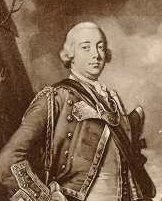
had been commissioned a captain in the 34th
Foot in June of 1744 and promoted again to
a major in February of 1747, and later he
was made a lieutenant-colonel of the 47th
Foot.
In 1753 Monckton was assigned to Nova Scotia,
as the second in command under Governor Hopson.
Hopson took sick and returned to England
and was replaced with Charles Lawrence. In
April, 1755 the Governors of the English
colonies met and felt that the French were
going to attack , even though both countries
were at peace. Two thousand troops were mustered
in Boston and sent to Monckton to take control
of the French Fort Beauséjour in Acadia.
On June 16th, 1755, the French surrendered
Fort Beauséjour and it was
renamed by Monckton as Fort
Cumberland. This start the conflict know
as the "Seven Years War". After
the fall of Fort Beauséjour, Governor Lawrence
decided to have Monckton take care of the
French Acadians for good. The Acadians would
not swear their allegiance to the King of England
and not to take up arms against the English.
Lawrence, operating out of Halifax, instructed
Monckton to break off a number of his troops
and send them under one of his brigadiers under
Winslow to another part of Acadia, Grand
Pré. He ordered ships up from Boston and the Acadians
were to be gathered together at several points,
loaded into the ships and sent away; to be
dispersed amongst the English colonists.
Their homes and possessions were to be put to be burnt to
the ground.
During the winter of 1758/59 Monckton was
in New York perfecting the plans for the
assault against Quebec. Monckton was to assumed
command of the city after it's fall. In 1761,
he was promoted major-general and was to
become the governor and commander-in-chief
in the province of New York. He organized
the attack on the French islands in the Caribbean,
which included Martinique. In 1763, the Seven
Years War was formally brought to an end
with the signing of the Treaty Of Paris, and he returned to England.
Monckton died in 1782 and is buried in London.